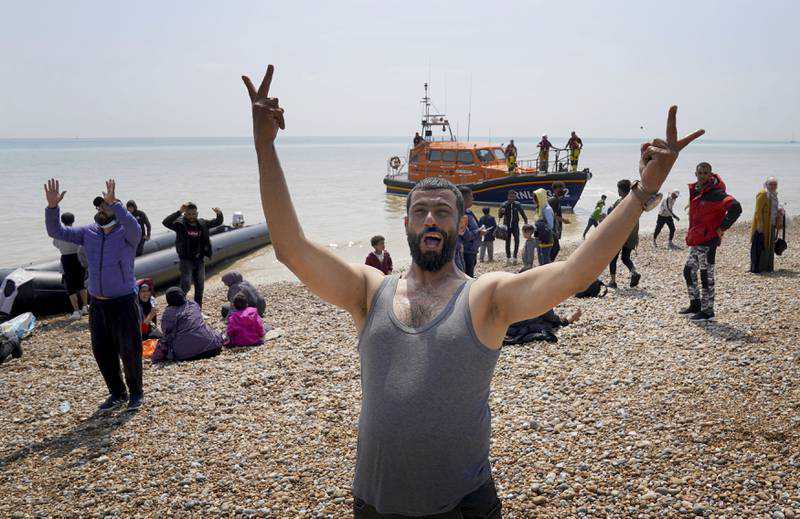Unstable boats crammed with people as smugglers cash in on English Channel crossings
18 August, 2021

People smugglers have increased passenger numbers on small boats crossing the English Channel at night to maximise their profits on single journeys, new rescue data obtained by The National shows.
Coastguard figures show nine boats carrying at least 50 people were intercepted or monitored by British officials in July this year off England’s south-east coast – more than in the whole of 2019 and 2020 combined.
The figures confirm intelligence reports that organised criminal gangs behind the lucrative trade are packing more people on to bigger boats and launching them across a longer section of the north European coastline to avoid patrols and ensure greater profit.
British law enforcement said last year that passengers were charged up to €5,000 ($5,882) for a berth, netting gangs €250,000 on some of the bigger boats. The takings contrast with the relatively small outlay for inflatable dinghies and underpowered engines for the short but treacherous crossings across the Channel that measures 34 kilometres at its narrowest point.
The highest estimated number packed on a single boat was 80 on July 19, showed data that runs from November 2018 to July 2021. It was escorted to a beach by a lifeboat from the south-east coastal town of Dungeness and met by police and border officials.
The vessel was part of what was then the largest number of people trying to cross the waterway on a single day when at least 430 people arrived.
That record was broken this month as the number of people crossing into the UK in 2021 topped 10,000, outstripping the 8,400 who arrived in small boats throughout 2020.
Dozens of people were photographed landing at the beach in Dungeness where some raised their hands in celebration. The passengers included the infirm, women and children, some of whom were too young to walk.
The UK’s Border Force declined to comment on “operational matters”.
Most small boats carried passengers in single digits in the first months of the records. No boat was reported to have ferried more than 50 occupants until August 2019, the figures show.
The rising numbers of those trafficked on cross-Channel boats replicates the trend in the Mediterranean. The gangs organising the shipping of people from North Africa regularly cram hundreds on board a vessel for the much longer crossing, heading for southern European countries such as Italy.
German rescue charity Sea-Watch told The National said that its rescue vessels discovered boats leaving Libya packed with 400 people.
As in the English Channel, the crossings become increasingly dangerous with more people on board. In the Mediterranean there have been instances of packed boats that foundered before rescue boats could reach them, the charity said. More than 1,100 people have died so far this year attempting to cross from North Africa to Europe.
The dangers of the much shorter crossing from France were highlighted on Thursday when a dinghy started sinking and 40 people on board had to be rescued.
One African, aged between 25 and 30, who was flown to hospital after suffering heart failure, later died. French officials launched a manslaughter investigation.
“The dinghy was sinking,” said Nicolas Margolle, the captain of the Nicolas Jeremy trawler who saved four Eritrean men. “The shipwrecked men were in hypothermia and very weak, they said they had been in the water for over three hours.”
In October last year, a Kurdish-Iranian family, including small children, died when a boat sank off the French coast.
In its annual threat assessment published in May, the National Crime Agency said the increase in small boats was almost certainly a result of Covid-19 travel restrictions affecting freight and air transport, as well as tighter security around UK-operated border controls in France.
“It is highly likely organised crime groups and migrants are attracted to the high success rate and low cost-high profit nature of small boats compared to heavy goods vehicle facilitation,” it said.
Migrating from small to large to avoid Dover Strait
Gangs “have attempted to transport migrants into the UK using larger vessels landing at small ports away from the Dover Strait”, the narrow section of water between Dover in south-east England and the French port of Calais.
“Migrants transported via this method have a higher chance of being exploited by UK-based criminals than those detected by law enforcement arriving by small boat.”
The new tactics were highlighted by the arrest of three men in November last year over an alleged attempt to smuggle 69 Albanians into the UK in a fishing boat. The trawler set off from Belgium but was intercepted off the coast of eastern England by British border guard vessels.
The latest figures show that dinghies are also carrying more people on the shorter and most widely used route across the Channel to the Dover area, identified as the “small boats area”.
Figures released by HM Coastguard covering the south-east coast of England showed there were 14 boats each carrying more than 50 migrants in the first seven months of 2021.
But in the 26 months from November 2018 to the end of 2020, there were only seven with similarly high numbers.
A spokesman for Channel Rescue, a volunteer organisation which monitors migrant arrivals from spotting points on England’s south coast, said migrants reported that the boats were getting bigger to pack more people on board.
HM Coastguard, which provided the figures, said: “We are committed to safeguarding life around the seas and coastal areas of this country. We are only concerned with preservation of life, rescuing those in trouble and bringing them safely back to shore, where they will be handed over to the relevant partner emergency services or authorities.”
Source: www.thenationalnews.com
